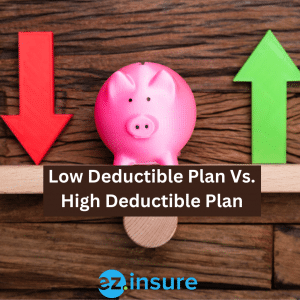
And when it comes to deductibles, you actually have choices. You can choose a high-deductible health plan (HDHP) or a low-deductible health plan (LDHP). But what’s the difference between these types of plans? This article will guide you through the specifics of HDHPs and LDHPs. As well as how to determine which type of plan will serve your needs most effectively based on your needs.
High Deductible Health Plans
A high deductible health plan (also known as a HDHP). As the name implies, is a type of health insurance policy that has a higher annual deductible than other types of healthcare plans. This difference can even be in the four-figure range. Meaning that you will most likely have to pay thousands of dollars out-of-pocket for medical care before your plan will begin to cover any expenses.
With that being said, monthly premiums for these plans tend to be lower than for other plans. And you will still have routine preventive care covered in full before you meet your deductible. As with any ACA-approved plan. The actual deductible you will have if you choose a HDHP will vary depending on your plan and insurance company, but there is a minimum deductible amount for a plan to be considered a HDHP, which changes each year. For 2023, the minimum annual deductible for individuals is $1,500, while the minimum for families is $3,000.
Advantages of HDHPs

Other than lower monthly premiums, there is one other big advantage to HDHPs. You can open a health savings account (HSA) in conjunction with a HDHP; in fact, in order to have an HSA, you must have a HDHP. HSAs can be a great way to help pay for your out-of-pocket medical expenses. They are tax-advantaged accounts that can be used to pay for qualified medical expenses that your plan doesn’t pay for. Such as acupuncture and dental expenses. Your contributions to your health savings account are not subject to income tax. And they can be used to reduce the overall cost of your high deductible.
Disadvantages of HDHPs
The high cost associated with these plans is the most significant and obvious disadvantage of HDHPs. If you have a higher deductible, it means that you are responsible for paying a greater portion of your healthcare costs out-of-pocket before your plan begins to contribute. This may put a significant dent in your financial resources. Particularly if you are forced to deal with unanticipated problems relating to your health.
Low Deductible Health Plans
One of the most significant differences between a HDHP and a LDHP is that a low deductible plan typically has a lower deductible. But a higher monthly premium payment.
Because of their lower deductibles, this type of plan is typically chosen by people who see their doctor more regularly. And who need more medical care. If this is the case for you, you might find that the higher amount you’re paying in monthly premiums is balanced out by the low deductible, since once you meet this lower amount, your insurance company will take care of your remaining costs. That could mean you’ll actually end up paying less out-of-pocket. In addition, LDHPs do not qualify for a health savings account (HSA), which is another difference between the two types of plans.
Advantages of LDHPs

- Women who are pregnant or who have the intention of becoming pregnant
- People who undergo a variety of specialized treatments or need expensive medications, such as those with cancer or on dialysis
- Any individual who is contemplating undergoing a surgical procedure within the next year
Disadvantages of LDHPs
Plans with low deductibles tend to have higher monthly premiums, since insurance companies will only cover a greater percentage of your care if you pay a higher premium. These premiums can feel like a burden each month, and if you don’t end up using your plan as often as you thought you might, you could start to feel like you’re wasting money.
Who Should Choose a High Deductible Health Plan?
As we pointed out above, a HDHP might be a good choice for you if you are healthy and anticipate having few to no healthcare expenses. In these circumstances, the lower monthly premiums that you would be paying for your “just in case” plan (which will also cover your preventive care), would save you money over a more expensive plan.
In addition, if you can’t afford a low deductible health insurance plan, you can still get yourself at least some level of coverage with a HDHP. And it’s important to have a plan, even if it has a high deductible, because health insurers negotiate rates with providers. This means you will pay less overall for products and services related to your health if you have health insurance than if you do not have health insurance.
In addition, your high-deductible health plan (HDHP) will pay for necessary medical care, such as preventive services, if you purchase the plan on the individual market. But even if you have enough money to pay for a low deductible health plan, it may be worthwhile to consider a high deductible health insurance plan. Remember that if you have a high deductible health plan (HDHP), you can help to offset your out-of-pocket expenses with a health savings account (HSA).
Who Should Choose a Low Deductible Health Plan?
Again, a health insurance policy with a low deductible is likely to be beneficial to you if you are an older person, if you are not in good health, if you have a chronic condition. If you are planning to start a family, or if you simply make frequent use of your health benefits.
If you have costly health issues, purchasing a LDHP could save you money over the course of the year. Even with the higher premiums. If you switched to a HDHP, the amount you would save in premiums would be a much smaller fraction of the total amount you would pay in deductibles with your HDHP. And, frankly, many individuals find that it is simpler to pay a slightly higher amount on a monthly basis as opposed to a much larger sum all at once. Getting a low deductible health insurance plan might be the best choice for you if you don’t want to deal with the stress of potentially expensive medical care.
How to Choose
It is difficult to make a direct recommendation for a plan without knowing your unique financial situation and your health status. But we can offer the following advice to help you make a decision. Your best bet, though, is to speak to an EZ agent. Who can take your specific circumstances into account and find the best plan for you.
1.Look for discounts
You might be eligible for assistance with your monthly premiums or cost-sharing expenses, depending on your income. So, before you write off a type of plan as too expensive. Ask an EZ agent if you qualify for subsidies or tax rebates.
2.Narrow down your choices
Think about the maximum amount of money you are willing to spend each month on your premium and go from there.
3.Look at additional features
When it comes to shopping for health insurance, deductibles are just one of many factors to take into account. Consideration should also be given to the size of the plan’s network, out-of-pocket maximums, and the structure of the plan. As well as the types of costs that are covered. After you have made a comparison of your expected medical costs for the year with the coverage options available to you. Look more closely at the plans you are considering. Ensuring that they provide the appropriate type of coverage for the amount of money you anticipate spending on healthcare.
4.Set your priorities
Your choice between a high deductible plan and a low deductible plan may come down to what you value more. The ability to save money on premiums if you are fortunate enough to not have many medical expenses. Or the peace of mind that comes from knowing that you won’t have to pay a deductible if you do end up needing more medical care. Doing some number crunching before making your decision might make things simpler for you.
Let EZ Help You
Do you need assistance comparing different plans and choosing the one that is best for your budget and healthcare needs? EZ.Insure is here to help! We will connect you with one of our dedicated, highly trained agents. Who will discuss all of your options with you and assist you in selecting the insurance policy that meets your needs, all at no cost to you. That’s right, there are no hidden fees associated with any of our services. EZ.Insure makes the entire process simple, easy, and quick. To get started, simply enter your zip code in the bar below. Or you can speak to an agent by calling 877-670-3557.
